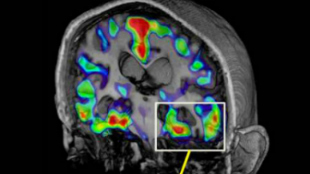Researchers have identified a genetic mutation that may help mitigate the risk of some forms of Alzheimer’s.
In a study published yesterday (November 4) in Nature Medicine, scientists describe the case of a woman from Medellín, Colombia, who lived into her 70s before developing a mild form of dementia, despite being a carrier for a genetic variant associated with early-onset Alzheimer’s.
One possible reason that the woman staved off dementia for so long, the team suggests in the paper, is that she also possesses another mutation, this time in the APOE gene, that could have had a protective effect.
“I’m very excited to see this new study come out—the impact is dramatic,” Yadong Huang, a neurologist at the Gladstone Institutes who was not involved in the research but coauthored an accompanying commentary article, tells The New York Times. “For both research and therapeutic development, this new finding is very important.”
The woman at the center of the study possesses a mutant version of PSEN1, a gene coding for a protein involved in processing amyloid precursor protein (APP) and other peptides. The variant is strongly associated with early-onset Alzheimer’s, with people showing signs of cognitive impairment by their mid-40s, and dementia by the time they’re 50.
Using brain imaging, researchers found that the woman had extremely high levels of amyloid in her brain by the time she reached 70. However, she had little in the way of other signs of Alzheimer’s pathology, such as neurodegeneration or an accumulation of tau protein.
“It actually illustrates, to my knowledge for the first time, a very clear dissociation of amyloid accumulation from tau pathology, neurodegeneration and even cognitive decline,” Huang, who has affiliations with companies working on Alzheimer’s treatments, tells the Times.
Scanning the woman’s DNA, the team found that she possessed two copies of a rare mutation in APOE, another gene associated with Alzheimer’s risk. The team showed using in vitro experiments that the sequence, known in the scientific literature as the Christchurch variant, stops the protein product of the gene from binding strongly to its usual targets—sugar molecules involved in the accumulation of tau and neuron damage—and could thus have had a protective effect.
Not everyone is convinced that this mutation is what protected the woman against early-onset Alzheimer’s. For starters, it’s just one of many rare variants that she, like any person, possesses. What’s more, people in her extended family who share the PSEN1 mutation and have one, rather than two, copies of the rare mutation in APOE show no evidence of protection against the disease.
“It would have been most convincing to show that while two copies of the Christchurch variant move the age of onset from early 40s to early 70s, one copy had a middling effect, moving the age to the early 50s,” Michael Greicius of Stanford University School of Medicine who was not involved in the study tells STAT. “But there was no ‘dose effect.’”
Study coauthor Eric Reiman of the Banner Alzheimer’s Institute in Phoenix says that the study could help boost interest in APOE-related therapies for Alzheimer’s. “When it comes to finding a treatment that could have a profound impact on the disease,” he tells Science, “APOE may be among the lowest hanging fruit.”







